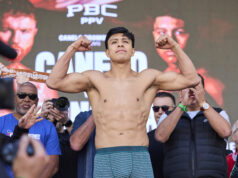Bob Arum is relying on a little guy, Zou Shiming, this weekend in Macau where money beckons and China’s untapped market awaits. It’s bold. It’s smart. It’s also not new.
Arum gambled on a little guy for the first time 25 years ago in Michael Carbajal, who in a different time and different hemisphere unlocked a new market.
Then, Mike Tyson and the heavyweights were going away. The sport was in transition, meaning it was searching for a new way to do business. It did, but at an unlikely end of the scale.
There was no money to be made at 108 and 112 pounds. Not then and often not in the years since Carbajal’s Hall of Fame career. Light-flyweights – a redundancy if there ever was one – and flyweights had a better chance at a paycheck if they replaced gloves with saddles and joined the jockey division. But Carbajal proved that one wrong early in his pro career by drawing crowds that suddenly appeared almost like spontaneous combustion.
Arum, who was talked into signing Carbajal after the 1988 Olympics by Richie Sandoval, discovered a market, primarily Mexican and Mexican-American, interested in the little guys. It has been paying dividends for years at weights – bantam, feather and super-feather – once relegated to forgotten spots on undercards. Manny Pacquiao, a former light-flyweight, became a sensation and a world-wide celebrity at feather.
Arum didn’t know what he had then. Nobody did. But the guess here is that the Carbajal experience tells him Zou Shiming can leave a global footprint that outweighs and outlasts traditional expectations from a weight never known to rock the pay scale.
From what he has seen of Zou Shiming, Carbajal is skeptical. He questions whether the Chinese fighter has enough power to make an impact as a pro.
“I don’t think he’s got the power he needs to win a world title,’’ Carbajal said as he sat on the front steps of his 9th Street Gym in an old Phoenix neighborhood where he was born. “He’s got to have that power, that’s all.’’
It’s fair skepticism, repeated often before Zou Shiming’s pro debut Saturday at 112 pounds against Eleazar Valenzuela (2-1-2, 1 KO) of Mexico. The card also includes World Boxing Association/World Boxing Organization flyweight champion Brian Viloria (32-3, 19 KOs) against Juan Francisco Estrada (22-2, 17 KOs) and WBO junior-lightweight champ Ramon Martinez (26-1-2, 16 KOs) against Diego Magdaleno (23-0, 9 KOs). Former heavyweight champ George Foreman, Larry Merchant and Tim Ryan will be at ringside for HBO2 at The Venetian-Macao for a telecast scheduled to air in the U.S. on Saturday, 2 p.m. (ET/PT).
The power question is familiar. It’s asked about most Olympians. Carbajal, a 1998 silver medalist, had to answer it in the initial stage of his pro career. Success in the amateurs, and especially the Olympics, is dictated by almost everything but power.
Shiming’s Olympic achievements are historical. Shiming, who won China’s first boxing medal – bronze – in 2004, won gold in 2008 and 2012 in the same weight class that Carbajal got silver in a controversial decision during the Seoul Games where the ring ropes might as well have been yellow crime tape. That’s where some scorecard alchemy turned Roy Jones Jr.’s gold into silver in a robbery witnessed by a world-wide audience.
Top Rank hired Freddie Roach to teach a pro, power-friendly style to Shiming, who spent more than a decade perfecting an amateur tactic suited best for a computer-based scoring system employed in the wake of the Jones scandal.
“Freddie has taught me a lot – including how to launch power from my legs, how I can give my opponent body shots,’’ Shiming said through a Top Rank publicist during news conferences in Macau and at Roach’s Wild Card Gym in Hollywood, Calif.. “A lot of things. He’s made me more skilled.
“In training camp with Freddie, I have to avoid as many power punches from my sparring partner as I can. I constantly need to remind myself this is not Olympic-style games. This is real. This is professional boxing.’’
A potential complication is Shiming’s age. He’s 31, which is old for fighters in the lightest divisions. Only the fly in the weight class is said to have a shorter shelf life. Carbajal was 32 in his memorable finale, an 11th-round stoppage of Jorge Arce, then 20, in a Tijuana bullring in September, 1999.
In part, Shiming’s age is a reason he appears to be on the fast-track.
“Shiming is going to be a world champion in a short time, possibly inside one year,’’ Roach said. “And I think he can do it in fewer fights than Leon Spinks, another Olympic gold medalist.’’
Spinks upset Muhammad Ali by split decision in February, 1978, his eighth pro fight after the 1976 Montreal Games.
“I think Zou can do it in his sixth professional fight, if not sooner,’’ Roach said.
It’s no coincidence that Viloria, a late-bloomer, is on Saturday’s card. He looms as a potential big name for Shiming in Arum’s plan to create a boxing market in a country where there was none not long ago. Arum was already a longtime promoter when boxing was still illegal in China. Chairman Mao was no fan.
In Shiming, however, there’s a well-known face with medals and credibility. China’s emerging generations know him. Maybe, they’ll follow him in a sport that their parents were ordered to avoid.
“As big a night as it is for me, it’s an even bigger night for the sport of boxing and boxing in China,’’ he said.
If Zou Shiming can pull it off, he might even convince Michael Carbajal with some history that will remind him that sometimes little guys can come up very big.






